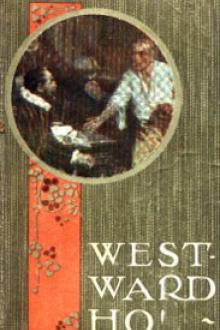Westward Ho! Or, The Voyages and Adventures of Sir Amyas Leigh, Knight, of Burrough, in the County of Devon, in the Reign of Her Most Glorious Majesty Queen Elizabeth by - (acx book reading .TXT) 📖

- Author: -
Book online «Westward Ho! Or, The Voyages and Adventures of Sir Amyas Leigh, Knight, of Burrough, in the County of Devon, in the Reign of Her Most Glorious Majesty Queen Elizabeth by - (acx book reading .TXT) 📖». Author -
“Go away!” she answered, struggling, and bursting into tears. “This is too rude. If I am but a merchant's daughter. I am God's child. Remember that I am alone. Leave me; go! or I will call for help!”
Eustace had heard or read somewhere that such expressions in a woman's mouth were mere facons de parler, and on the whole signs that she had no objection to be alone, and did not intend to call for help; and he only grasped her hands the more fiercely, and looked into her face with keen and hungry eyes; but she was in earnest, nevertheless, and a loud shriek made him aware that, if he wished to save his own good name, he must go: but there was one question, for an answer to which he would risk his very life.
“Yes, proud woman! I thought so! Some one of those gay gallants has been beforehand with me. Tell me who—”
But she broke from him, and passed him, and fled down the lane.
“Mark it!” cried he, after her. “You shall rue the day when you despised Eustace Leigh! Mark it, proud beauty!” And he turned back to join Campian, who stood in some trepidation.
“You have not hurt the maiden, my son? I thought I heard a scream.”
“Hurt her! No. Would God that she were dead, nevertheless, and I by her! Say no more to me, father. We will home.” Even Campian knew enough of the world to guess what had happened, and they both hurried home in silence.
And so Eustace Leigh played his move, and lost it.
Poor little Rose, having run nearly to Chapel, stopped for very shame, and walked quietly by the cottages which stood opposite the gate, and then turned up the lane towards Moorwinstow village, whither she was bound. But on second thoughts, she felt herself so “red and flustered,” that she was afraid of going into the village, for fear (as she said to herself) of making people talk, and so, turning into a by-path, struck away toward the cliffs, to cool her blushes in the sea-breeze. And there finding a quiet grassy nook beneath the crest of the rocks, she sat down on the turf, and fell into a great meditation.
Rose Salterne was a thorough specimen of a West-coast maiden, full of passionate impulsive affections, and wild dreamy imaginations, a fit subject, as the North-Devon women are still, for all romantic and gentle superstitions. Left early without mother's care, she had fed her fancy upon the legends and ballads of her native land, till she believed—what did she not believe?—of mermaids and pixies, charms and witches, dreams and omens, and all that world of magic in which most of the countrywomen, and countrymen too, believed firmly enough but twenty years ago. Then her father's house was seldom without some merchant, or sea-captain from foreign parts, who, like Othello, had his tales of—
“Antres vast, and deserts idle, Of rough quarries, rocks, and hills whose heads reach heaven.”And,—
“And of the cannibals that each other eat, The anthropophagi, and men whose heads Do grow beneath their shoulders.”All which tales, she, like Desdemona, devoured with greedy ears, whenever she could “the house affairs with haste despatch.” And when these failed, there was still boundless store of wonders open to her in old romances which were then to be found in every English house of the better class. The Legend of King Arthur, Florice and Blancheflour, Sir Ysumbras, Sir Guy of Warwick, Palamon and Arcite, and the Romaunt of the Rose, were with her text-books and canonical authorities. And lucky it was, perhaps, for her that Sidney's Arcadia was still in petto, or Mr. Frank (who had already seen the first book or two in manuscript, and extolled it above all books past, present, or to come) would have surely brought a copy down for Rose, and thereby have turned her poor little flighty brains upside down forever. And with her head full of these, it was no wonder if she had likened herself of late more than once to some of those peerless princesses of old, for whose fair hand paladins and kaisers thundered against each other in tilted field; and perhaps she would not have been sorry (provided, of course, no one was killed) if duels, and passages of arms in honor of her, as her father reasonably dreaded, had actually taken place.
For Rose was not only well aware that she was wooed, but found the said wooing (and little shame to her) a very pleasant process. Not that she had any wish to break hearts: she did not break her heart for any of her admirers, and why should they break theirs for her? They were all very charming, each in his way (the gentlemen, at least; for she had long since learnt to turn up her nose at merchants and burghers); but one of them was not so very much better than the other.
Of course, Mr. Frank Leigh was the most charming; but then, as a courtier and squire of dames, he had never given her a sign of real love, nothing but sonnets and compliments, and there was no trusting such things from a gallant, who was said (though, by the by, most scandalously) to have a lady love at Milan, and another at Vienna, and half-a-dozen in the Court, and half-a-dozen more in the city.
And very charming was Mr. William Cary, with his quips and his jests, and his galliards and lavoltas; over and above his rich inheritance; but then, charming also Mr. Coffin of Portledge, though he were a little proud and stately; but which of the two should she choose? It would be very pleasant to be mistress of Clovelly Court; but just as pleasant to find herself lady of Portledge, where the Coffins had lived ever since Noah's flood (if, indeed, they had not merely returned thither after that temporary displacement), and to bring her wealth into a family which was as proud of its antiquity as any nobleman in Devon, and might have made a fourth to that famous trio of Devonshire Cs, of which it is written,—
“Crocker, Cruwys, and Copplestone, When the Conqueror came were all at home.”And Mr. Hugh Fortescue, too—people said that he was certain to become a great soldier—perhaps as great as his brother Arthur—and that would be pleasant enough, too, though he was but the younger son of an innumerable family: but then, so was Amyas Leigh. Ah, poor Amyas! Her girl's fancy for him had vanished, or rather, perhaps, it was very much what it always had been, only that four or five more girl's fancies beside it had entered in, and kept it in due subjection. But still, she could not help thinking a good deal about him, and his voyage, and the reports of his great strength, and beauty, and valor, which had already reached her in that out-of-the-way corner; and though she was not in the least in love with him, she could not help hoping that he had at least (to put her pretty little thought in the mildest shape) not altogether forgotten her; and was hungering, too, with all her fancy, to give him no peace till he had told her all the wonderful things which he had seen and done in this ever-memorable voyage. So that, altogether, it was no wonder, if in her last night's dream the figure of Amyas had been even more forward and troublesome than that of Frank or the rest.
But, moreover, another figure had been forward and troublesome enough in last night's sleep-world; and forward and troublesome enough, too, now
 Have you ever thought about what fiction is? Probably, such a question may seem surprising: and so everything is clear. Every person throughout his life has to repeatedly create the works he needs for specific purposes - statements, autobiographies, dictations - using not gypsum or clay, not musical notes, not paints, but just a word. At the same time, almost every person will be very surprised if he is told that he thereby created a work of fiction, which is very different from visual art, music and sculpture making. However, everyone understands that a student's essay or dictation is fundamentally different from novels, short stories, news that are created by professional writers. In the works of professionals there is the most important difference - excogitation. But, oddly enough, in a school literature course, you don’t realize the full power of fiction. So using our website in your free time discover fiction for yourself.
Have you ever thought about what fiction is? Probably, such a question may seem surprising: and so everything is clear. Every person throughout his life has to repeatedly create the works he needs for specific purposes - statements, autobiographies, dictations - using not gypsum or clay, not musical notes, not paints, but just a word. At the same time, almost every person will be very surprised if he is told that he thereby created a work of fiction, which is very different from visual art, music and sculpture making. However, everyone understands that a student's essay or dictation is fundamentally different from novels, short stories, news that are created by professional writers. In the works of professionals there is the most important difference - excogitation. But, oddly enough, in a school literature course, you don’t realize the full power of fiction. So using our website in your free time discover fiction for yourself. 




Comments (0)